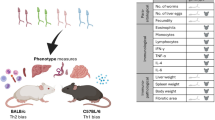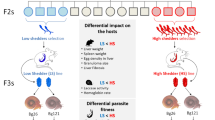Abstract
Intraspecific variation in Schistosoma mansoni infection and modulation of its expression by vertebrate host genetics was studied by evaluation of some biological parameters of the infection in BALB/c and C57BL/6 mice infected with one Brazilian (BH) and two Venezuelan (YT and SM) laboratory strains of the parasite. Mice infected with 60 cercariae of each parasite strain were euthanized at 5, 6, 8, and 12 weeks. Parameters recorded included the number of adult worms recovered by portal perfusion (infectivity); the number of eggs in the feces, the intestine, and the liver; and the ability of the eggs to cross the intestine, expressed as a quotient of the number of eggs in the intestine versus the feces. Results showed that the parasite appeared to determine the infectivity, the sex ratio, the onset and timing of oviposition, the number of eggs produced, initial egg laying toward the liver, and the ability to cross the intestinal wall. In this sense the BH strain appeared to be the most efficient and the SM strain, the most delayed; the YT strain was intermediate, although closer to the SM strain. On the other hand, the host appeared to influence the susceptibility to infection, the fecundity, and the percentage of eggs distributed in the liver and in the intestine during the chronic stage. In this sense, although they have been shown to be less susceptible to infection than BALB/c mice, C57BL/6 mice permit more eggs to be produced and exhibit similar numbers of eggs in the intestine and the liver at certain time points. It appears from these results that parasite genetics is essential for the outcome of infection with S. mansoni, but some characteristics may be quantitatively modulated by host genetics.
Similar content being viewed by others
Author information
Authors and Affiliations
Additional information
Received: 13 March 2000 / Accepted: 3 July 2000
Rights and permissions
About this article
Cite this article
Nino Incani, R., Morales, G. & Cesari, I. Parasite and vertebrate host genetic heterogeneity determine the outcome of infection by Schistosoma mansoni . Parasitol Res 87, 131–137 (2001). https://doi.org/10.1007/PL00008565
Issue Date:
DOI: https://doi.org/10.1007/PL00008565




